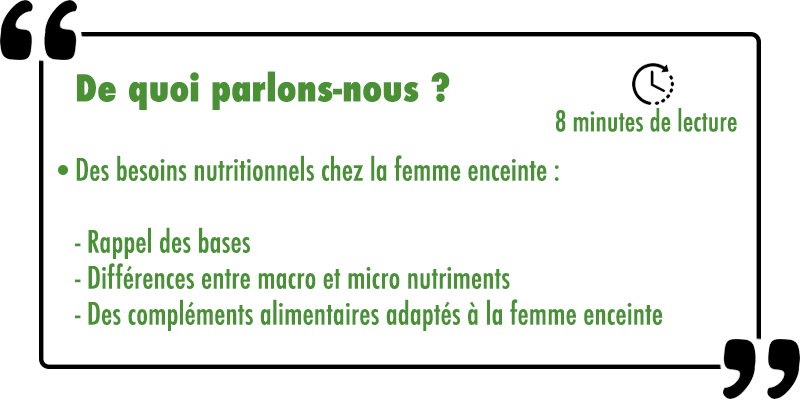We receive a lot of questions from pregnant women , concerned about their desire to eat well to stay in shape and ensure the best development of their baby .
Argalys offers you a clear and easily applicable summary of good dietary practices during pregnancy .
In a desire for overall understanding, without getting lost in the details, we have consciously eliminated any reference to doses, grams or milligrams: if necessary, you will easily find this information on the Internet.

Basic nutritional principles to know for pregnant women
There are 2 basic principles to know:
- Your future baby will share with you EVERYTHING that circulates in your blood.
Obviously the essential nutrients, but also all the less desirable molecules that you could absorb.
- Your daily nutritional needs will gradually increase.
It is no longer enough to feed yourself to maintain your own body, but you must also ensure the growth of the fetus: the incidence is (almost) insignificant at the beginning and significant from the 2/ 3rd month, in proportion to the weight growth needs. of the fetus which are increasing.
If you keep these 2 obvious principles in mind , you will be able to provide your future baby with the optimal nutritional environment for his development.
Let’s go back in a little detail.
Eliminate the ingestion of harmful molecules during pregnancy
- Pregnant women: Eliminate the ingestion of harmful molecules as much as possible:
This is essential: an almost insignificant blood dose for an adult weighing several dozen kilos (you) is no longer at all for a fetus weighing a few hundred grams.
Alcohol, tobacco, psychotropic substances: you already know this, but it's zero, zero, zero.
When your baby is born, it won't occur to you to offer him a cigarette and a glass of wine, will you?…
Well during pregnancy, it's the same, since all the alcohol or nicotine ingested will pass into your blood and therefore into his.
If you smoke, do not take it as a good performance to reduce your consumption: the best practice is zero cigarettes during pregnancy , all other compromises are harmful for your baby.
Remember that tobacco smoke contains hundreds of unfriendly molecules, such as arsenic or heavy metals like cadmium, etc. This total abstinence also applies to the other two categories.
- Other substances to avoid in pregnant women
It is more important to warn you against products considered more harmless:
Tea and Coffee:
Theine and caffeine are not insignificant products: their stimulating and exciting effect on the nervous system is clearly established, and obviously even more marked for a developing fetus.
You will have understood, again a great moderation is reasonable (in addition: caffeine and theine reduce the absorption of iron ).
Note that the caffeine content of 'short' coffees (espresso etc.) is generally much lower than that of 'long' coffees: longer percolation promotes more complete extraction of the caffeine.
Food additives :
We are not going to list them all because some are harmless but others less so and we keep in mind that the fetus is much more fragile and sensitive than us therefore: as a general rule, favor foods without additives: choose it. homemade' as much as possible
Heavy metals :
They are unfortunately quite present in fatty fish, a consequence of ocean pollution, so consume in moderation, despite their nutritional value (Omega 3 /DHA);
Non-vegetable sugars and fats:
To be consumed in moderation by pregnant women (see below §3 nutritional needs)

The nutritional needs of pregnant women are increased
On a qualitative level, from the start of pregnancy it is reasonable to ensure good intake of micronutrients (vitamins and minerals and DHA Omega 3 very present in all nervous tissues)
From around the 3rd month, the weight growth of the fetus will become significant and increase the nutritional needs of the mother.
Water remains the first necessary food and good hydration is an essential precaution but care must be taken to ensure a good intake of macronutrients and micronutrients in the diet of pregnant women.
Macronutrients:
It is reasonable to gradually increase (up to +20%) protein consumption (increase the share of plant proteins in your diet).
This is an important point for fetal growth and it is useful to consult a nutritionist or dietitian to balance your menus on this point.
- Sugars and lipids: focus on quality, reduce the rest
Daily energy needs in pregnant women increase by approximately 15% (250/300 kcal) because glucose is necessary for the development of the fetus.
Eat cereals, fruits and vegetables cooked 'home' and in this case follow your desires and your appetite.
Really moderate all foods high in fat* and added sugars, snacking, etc.
Without going into detail (see: 'brown' or 'white' adipose tissue etc.), fetal adipocytes (fat storage cells) develop during growth in utero. They are certainly necessary but they should not be present in excess, otherwise there is a risk of giving your baby the potential for pre-obesity.
* vegetable oils escape this moderation, in particular those rich in Omega 3 ALA (rapeseed oil, nuts, etc.).
Micro Nutrition:
These are the essential invisibles with short, medium and long term effects
From the start of pregnancy :
- A broad-spectrum Multivitamin/Mineral dosed at 100% of the RDA, in addition to your diet ensuring, without any risk, the fine coverage of your needs.
- A daily intake of DHA (250 mg/day).
Multivitamins and minerals:
There is no risk in consuming vitamins and minerals in pregnant women as long as we remain within the limits defined by the health authorities (ANSES-Afssa in France) who always take into account the situation of pregnant women before to issue an opinion.
Note that vitamin C supplementation is not essential ( you will find it in fruits).
Vitamins B12, B1, B6, A and E and biotin are very useful, as are the trace minerals which contribute to growth (zinc, manganese, iodine etc.) and dynamism (magnesium etc.). Vitamin B9 should not be neglected in pregnant women. It is nicknamed the pregnant woman's vitamin because it helps protect against certain congenital malformations, plays a role in the production of DNA and the functioning of the nervous and immune systems.
Intake of DHA Omega 3 (250 mg/day):
We have mentioned the high heavy metal contents of most oily fish, so it is more prudent to favor DHA intake in capsules:
- Either based on fish or krill oils which are filtered and purified (and therefore with heavy metal contents complying with European standards).
- Or based on plants (algae), such as DHA from Argalys Essentiels .
Usefulness : DHA is essential for the constitution of the nervous tissues of the fetus . Like all Omega 3, it also thins the blood and facilitates circulation.
From approximately the 3rd month of pregnancy
- Evaluate your daily calcium intake.
Calcium is the most abundant mineral in our body (particularly the skeleton).
Insufficient intakes will create transfers of your own calcium reserves to the fetus whose needs increase.
You risk demineralization, the long-term effects of which are always harmful (increased risk of osteoporosis).
Daily calcium supplementation of around 30 to 50% of the RDI (300 to 500 mg of calcium) is a good precaution. You should aim for an overall intake of slightly more than 1 gram/day.
Our food supplement Calcium + Vitamin D3 and Boron is a good daily aid .
- The case of Iron: under medical supervision.
A blood iron test at the start of pregnancy is very useful in estimating the risk of iron deficiency anemia.
Daily iron requirements in pregnant women are increased by approximately 20% (20 mg/day); iron supplementation is frequently relevant for diets low in meat products.
Health risks linked to the diet of pregnant women
The best known risks:
- Listeriosis: avoid unpasteurized cheeses, raw foods (shellfish, etc.), wash fruits and vegetables well ( add baking soda to the soaking water to increase the effectiveness of cleaning)/
- Toxoplasmosis : (if you are not immune), watch out for cats and garden with gloves.
Food for future Vegan mothers:
- Advantages :
Your diet is already healthy with a significant portion of fruits and vegetables.
You know the importance of vitamin B12 in pregnant women . If this is not the case, we invite you to consult our articles on this subject .
- Points of vigilance
Protein intake with a good balance of all essential amino acids.
Our advice: consult a dietician or nutritionist .
Argalys Essential food supplements for pregnant women
Our Argalys Essentiels range is suitable for safe nutrition for pregnant women .
The table below groups together the different products in our range and their importance in nutrition during pregnancy.
| Argalys Essential Formulas | 1st quarter | From the 3rd month | Vegan |
| Multivitamins and minerals * | daily (1 capsule) | daily (1 capsule) | daily (1 capsule) |
| Calcium + Vitamin D3 and Boron | depending on other intakes 1 to 2 capsules/day | depending on other intakes 1 to 2 capsules/day | |
| Iron + Vitamin C, B9 and Carrot | If necessary, with prior blood test | If necessary, with prior blood test | If necessary, with prior blood test |
| Omega 3 DHA vegan | daily (1 capsule) | daily (1 capsule) | daily (1 capsule) |
| Magnesium + potassium | Occasionally in case of fatigue | Occasionally in case of fatigue | Occasionally in case of fatigue |
| Vegaflore (pre and probiotics) | Occasionally in case of intestinal discomfort | Occasionally in case of intestinal discomfort | Occasionally in case of intestinal discomfort |
* Note: for vegans during pregnancy we do not recommend taking the vitamin B12 supplement (1mg) + iodine and Selenium so as not to have a occasionally very high blood B12 level (even if no maximum daily dose is defined for vitamin B12) : the Multivitamin and mineral taken daily is a better option.
Argalys.
 04 74 03 98 80
04 74 03 98 80









